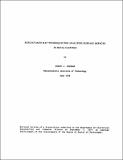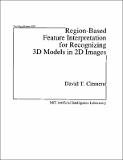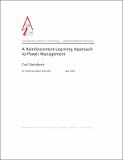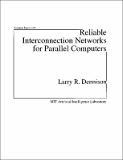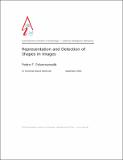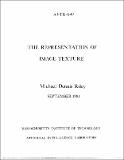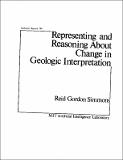Browsing AI Technical Reports (1964 - 2004) by Title
Now showing items 221-240 of 327
-
Qualitative Analysis of MOS Circuits
(1984-07-01)With the push towards sub-micron technology, transistor models have become increasingly complex. The number of components in integrated circuits has forced designer's efforts and skills towards higher levels of design. ... -
Qualitative and Quantitative Knowledge in Classical Mechanics
(1975-12-01)This thesis investigates what knowledge is necessary to solve mechanics problems. A program NEWTON is described which understands and solves problems in mechanics mini-world of objects moving on surfaces. Facts and ... -
Qualitative Knowledge, Casual Reasoning and the Localization of Failures
(1976-11-01)This report investigates some techinques appropriate to representing the knowledge necessary for understanding a class of electronic machines -- radio receivers. A computational performance model - WATSON - is presented. ... -
Qualitative Process Theory
(1984-07-01)Objects move, collide, flow, bend, heat up, cool down, stretch, compress and boil. These and other things that cause changes in objects over time are intuitively characterized as processes. To understand common sense ... -
RABBIT: A Compiler for SCHEME
(1978-05-01)We have developed a compiler for the lexically-scoped dialect of LISP known as SCHEME. The compiler knows relatively little about specific data manipulation primitives such as arithmetic operators, but concentrates ... -
A Radial Basis Function Approach to Financial Time Series Analysis
(1993-12-01)Nonlinear multivariate statistical techniques on fast computers offer the potential to capture more of the dynamics of the high dimensional, noisy systems underlying financial markets than traditional models, while ... -
Reasoning from Incomplete Knowledge in a Procedural Deduction System
(1975-12-01)One very useful idea in AI research has been the notion of an explicit model of a problem situation. Procedural deduction languages, such as PLANNER, have been valuable tools for building these models. But PLANNER and its ... -
Reasoning Modeled as a Society of Communicating Experts
(1979-06-01)This report describes a domain independent reasoning system. The system uses a frame-based knowledge representation language and various reasoning techniques including constraint propagation, progressive refinement, ... -
Recognition of Topological Invariants by Iterative Arrays
(1969-10-01)A study is made of the recognition and transformation of figures by iterative arrays of finite state automata. A figure is a finite rectangular two-dimensional array of symbols. The iterative arrays considered are ... -
Recognizing 3-D Objects Using 2-D Images
(1993-04-01)We discuss a strategy for visual recognition by forming groups of salient image features, and then using these groups to index into a data base to find all of the matching groups of model features. We discuss the most ... -
Reconfigurable Architectures for General-Purpose Computing
(1996-09-01)General-purpose computing devices allow us to (1) customize computation after fabrication and (2) conserve area by reusing expensive active circuitry for different functions in time. We define RP-space, a restricted ... -
Redundant Sensors for Mobile Robot Navigation
(1985-09-01)Redundant sensors are needed on a mobile robot so that the accuracy with which it perceives its surroundings can be increased. Sonar and infrared sensors are used here in tandem, each compensating for deficiencies in ... -
Reflectance Map Techniques for Analyzing Surface Defects in Metal Castings
(1978-06-01)This report explores the relation between image intensity and object shape. It is shown that image intensity is related to surface orientation and that a variation in image intensity is related to surface curvature. ... -
Region-Based Feature Interpretation for Recognizing 3D Models in 2D Images
(1991-06-01)In model-based vision, there are a huge number of possible ways to match model features to image features. In addition to model shape constraints, there are important match-independent constraints that can efficiently ... -
Reinforcement Learning by Policy Search
(2003-02-14)One objective of artificial intelligence is to model the behavior of an intelligent agent interacting with its environment. The environment's transformations can be modeled as a Markov chain, whose state is partially ... -
A Reinforcement-Learning Approach to Power Management
(2002-05-01)We describe an adaptive, mid-level approach to the wireless device power management problem. Our approach is based on reinforcement learning, a machine learning framework for autonomous agents. We describe how our ... -
Reliable Interconnection Networks for Parallel Computers
(1991-10-01)This technical report describes a new protocol, the Unique Token Protocol, for reliable message communication. This protocol eliminates the need for end-to-end acknowledgments and minimizes the communication effort ... -
Representation and Detection of Shapes in Images
(2003-08-08)We present a set of techniques that can be used to represent and detect shapes in images. Our methods revolve around a particular shape representation based on the description of objects using triangulated polygons. This ... -
The Representation of Image Texture
(1981-09-01)This thesis explores how to represent image texture in order to obtain information about the geometry and structure of surfaces, with particular emphasis on locating surface discontinuities. Theoretical and psychophysical ... -
Representing and Reasoning About Change in Geologic Interpretation
(1983-12-01)Geologic interpretation is the task of inferring a sequence of events to explain how a given geologic region could have been formed. This report describes the design and implementation of one part of a geologic interpretation ...












